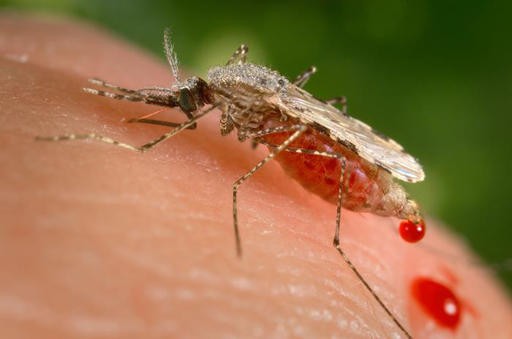Popular Reads
Top Results
Can't find what you're looking for?
View all search resultsPopular Reads
Top Results
Can't find what you're looking for?
View all search results'Super malaria' spreading through SE Asia, poses global threat
Change text size
Gift Premium Articles
to Anyone
 In this photo provided by the Centers for Disease Control and Prevention (CDC ), a feeding female Anopheles stephensi mosquito crouching forward and downward on her forelegs on a human skin surface, in the process of obtaining its blood meal through its sharp, needle-like labrum, which it had inserted into its human host. A powerful new technology holds the promise of rapidly altering genes to make malaria-proof mosquitoes, eliminate their Zika-carrying cousins or wipe out an invasive species, but advisers to the government say these so-called (CDC via AP/James Gathany)
In this photo provided by the Centers for Disease Control and Prevention (CDC ), a feeding female Anopheles stephensi mosquito crouching forward and downward on her forelegs on a human skin surface, in the process of obtaining its blood meal through its sharp, needle-like labrum, which it had inserted into its human host. A powerful new technology holds the promise of rapidly altering genes to make malaria-proof mosquitoes, eliminate their Zika-carrying cousins or wipe out an invasive species, but advisers to the government say these so-called (CDC via AP/James Gathany)
A
"super malaria" parasite is spreading through South-east Asia at an alarming rate and poses a global threat, scientists have warned.
This dangerous form of the parasite that is transmitted by blood-sucking mosquitoes cannot be killed with the main drugs currently used to treat the infectious disease.
It first surfaced in Cambodia, but has since been detected in parts of Thailand and Laos, and has arrived in southern Vietnam, the BBC reported.
Scientists at the Oxford Tropical Medicine Research Unit in Bangkok warned that there is a real danger of malaria becoming untreatable in a letter published in The Lancet Infectious Diseases.
"We think it is a serious threat," said Prof Arjen Dondorp, the head of the unit. "It is alarming that this strain is spreading so quickly through the whole region and we fear it can spread further (and eventually) jump to Africa."
About 212 million people are infected with malaria each year and the first choice treatment is artemisinin in combination with piperaquine.
However, artemesinin has become less effective over time and now, the parasite has evolved to resist piperaquine too, with "alarming rates of failure" for treatment, the letter said.
The treatment was failing around a third of the time in Vietnam and in some regions of Cambodia, it was as high as 60 per cent, according to Prof Dondorp.
If similar resistance emerged in Africa, where around 92 per cent of malaria cases are reported, it would be catastrophic.
"It's a race against the clock - we have to eliminate it before malaria becomes untreatable again and we see a lot of deaths," Prof Dondorp said. "If I'm honest, I'm quite worried."
Dr Michael Chew, from the Wellcome Trust medical research charity, said: "The spread of this malaria 'superbug' strain, resistant to the most effective drug we have, is alarming and has major implications for public health globally."
"Around 700,000 people a year die from drug-resistant infections, including malaria. If nothing is done, this could increase to millions of people every year by 2050," he said.









